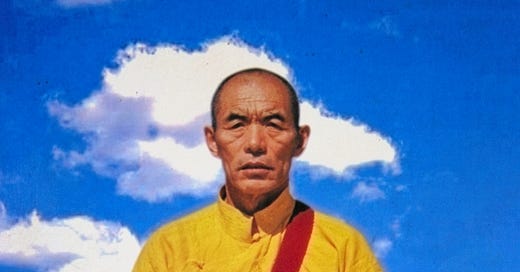Rigpa--an Important Word You Don't Need to Know
It simply means resting in the nature of mind, which may not be simple to do.
Rest in natural great peace This exhausted mind Beaten helpless by karma and neurotic thought Like the relentless fury of pounding waves In the infinite ocean of samsāra. --Nyoshul Khenpo Rinpoche Natural Great PeaceWhat is the path of Dzogchen? Simply resting in this recognition, nothing more. You don’t need to cultivate anything. You couldn’t change or improve this natural great peace even if you tried! Once you are introduced to the nature of mind then all you need do is rest there. It’s not a path of renunciation. There’s nothing we need to give up. All of life is available to us with the Dzogchen path. All of it can be integrated. All of it reveals the true nature of mind. —Chodpa
Once again, I’m grateful to my dharma friend and fellow blogger Chodpa for the quotation that inspired this blog post. Rigpa is a word used by Dzogchen practitioners. The experiential state of Rigpa can’t be fully described in words and concepts, but we can approximate a definition as:
resting in the pure nature of mind, which perceives the world as it really is, in its nondual state.
As for Dzogchen, it is the Tibetan name for a highly esteemed path to awakening practiced in Bon and Buddhism. It means Great Completion or Great Perfection, suggesting that enlightenment is within reach in one lifetime.
Unless you’re particularly fascinated by the workings of the esoteric (vegan) sausage factory, I suggest you forget words like Dzogchen and Rigpa and focus instead on practices that help you make friends with your mind, find its true nature, and rest there.
Rest in natural great peace This exhausted mind Beaten helpless by karma and neurotic thought
One word worth remembering is Vajrayana, the “vehicle” of Buddhist teachings closely associated with Tibet. Most Vajrayana teachers will help you find the pure nature of mind regardless of the names they use for it.1
In explaining a famous quotation from Padmasambhava, Tulku Urgyen Rinpoche refers to nature of mind as the view:
Padmasambhava said: “Though the view should be as vast as the sky, keep your conduct as fine as barley flour.” Don’t confuse one with the other. When training in the view, you can be as unbiased, as impartial, as vast, immense, and unlimited as the sky. Your behavior, on the other hand, should be as careful as possible in discriminating what is beneficial or harmful, what is good or evil. One can combine the view and conduct, but don’t mix them or lose one in the other. That is very important.
“View like the sky” means that nothing is held onto in any way whatsoever. You are not stuck anywhere at all. In other words, there is no discrimination as to what to accept and what to reject; no line is drawn separating one thing from another. “Conduct as fine as barley flour” means that there is good and evil, and one needs to differentiate between the two. Give up negative deeds; practice the Dharma. In your behavior, in your conduct, it is necessary to accept and reject.
Try imagining a mirror in the shape of a ball. It’s a perfect, unsmudged, and unblemished mirror that reflects reality with 100% accuracy. It observes concepts like you and me, this and that, here and there, yesterday and tomorrow as artifices we use to navigate the world we live in but not as lasting realities.
The overwhelming majority of us need a teacher to help us find and rest in that space, which can also be considered our innate Buddha Nature. Yongey Mingyur Rinpoche’s worldwide Tergar organization has programs that start at any level of interest and guide students to the nature of mind. Although I have no credentials as a Vajrayana teacher, I recorded a meditation to convey just a hint of what that experience might be like for you. You can access it here:
Finding Your Island of Refuge
What has been is what will be, and what has been done is what will be done, and there is nothing new under the sun. —Ecclesiastes 1:9 English Standard Version
If you had a hectic Thanksgiving yesterday, or if you didn’t, may you find whatever practice suits you to rest in your island of refuge.
From the Pure Land has thousands of readers and hundreds of subscribers in 33 U.S. states and 14 countries. The podcast has listeners in 40 countries. Consider:
If you are not already a subscriber, please become one. Free and paid subscribers receive the same content, but subscribing for $5 a month or $50 a year helps support my mission to reduce the world’s suffering.
Make a one-time gift of any amount.
Share this post with a friend.
Listen and subscribe to the From the Pure Land podcasts via your favorite app or by clicking here.
“Gone, gone, gone further out, completely gone far out. So be it!”
I use Vajrayana rather than “Tibetan Buddhism” because most of the great current teachers no longer reside in Chinese-occupied Tibet.





